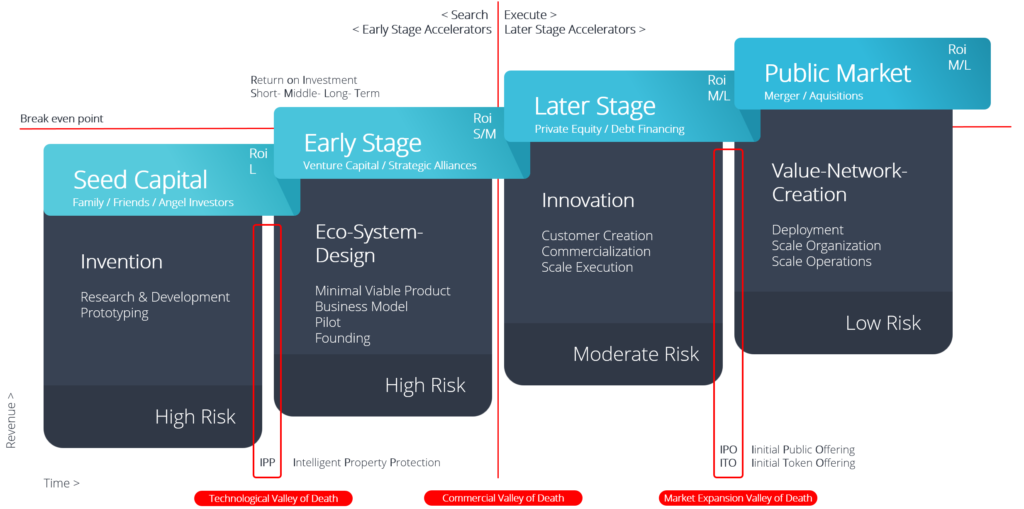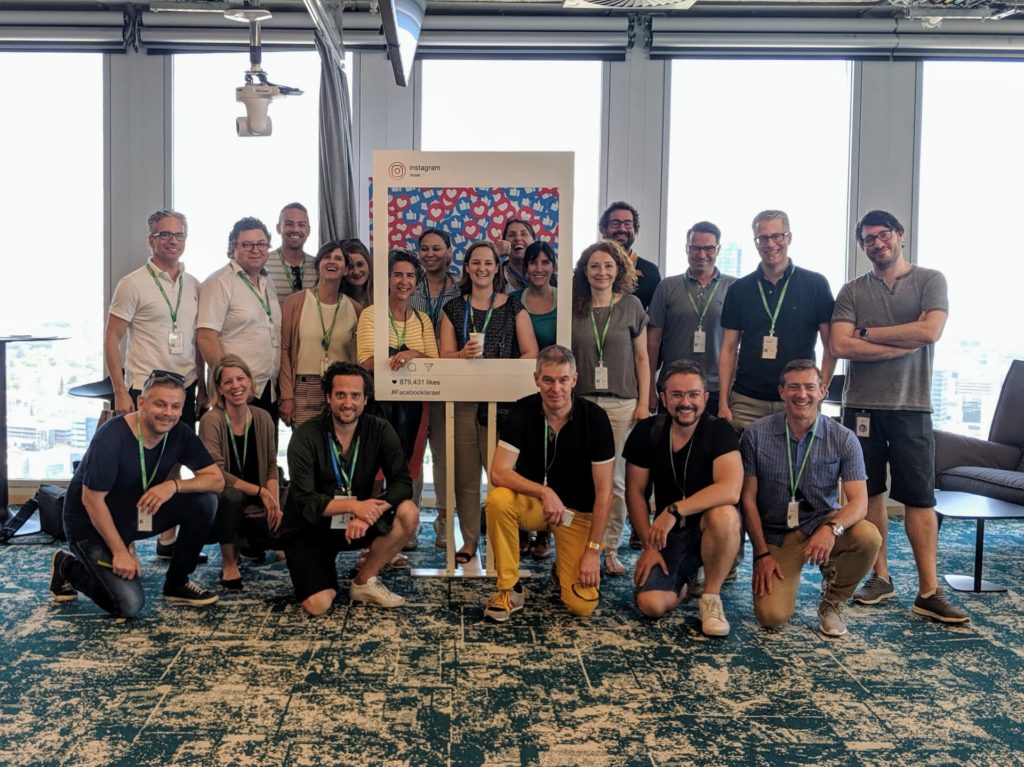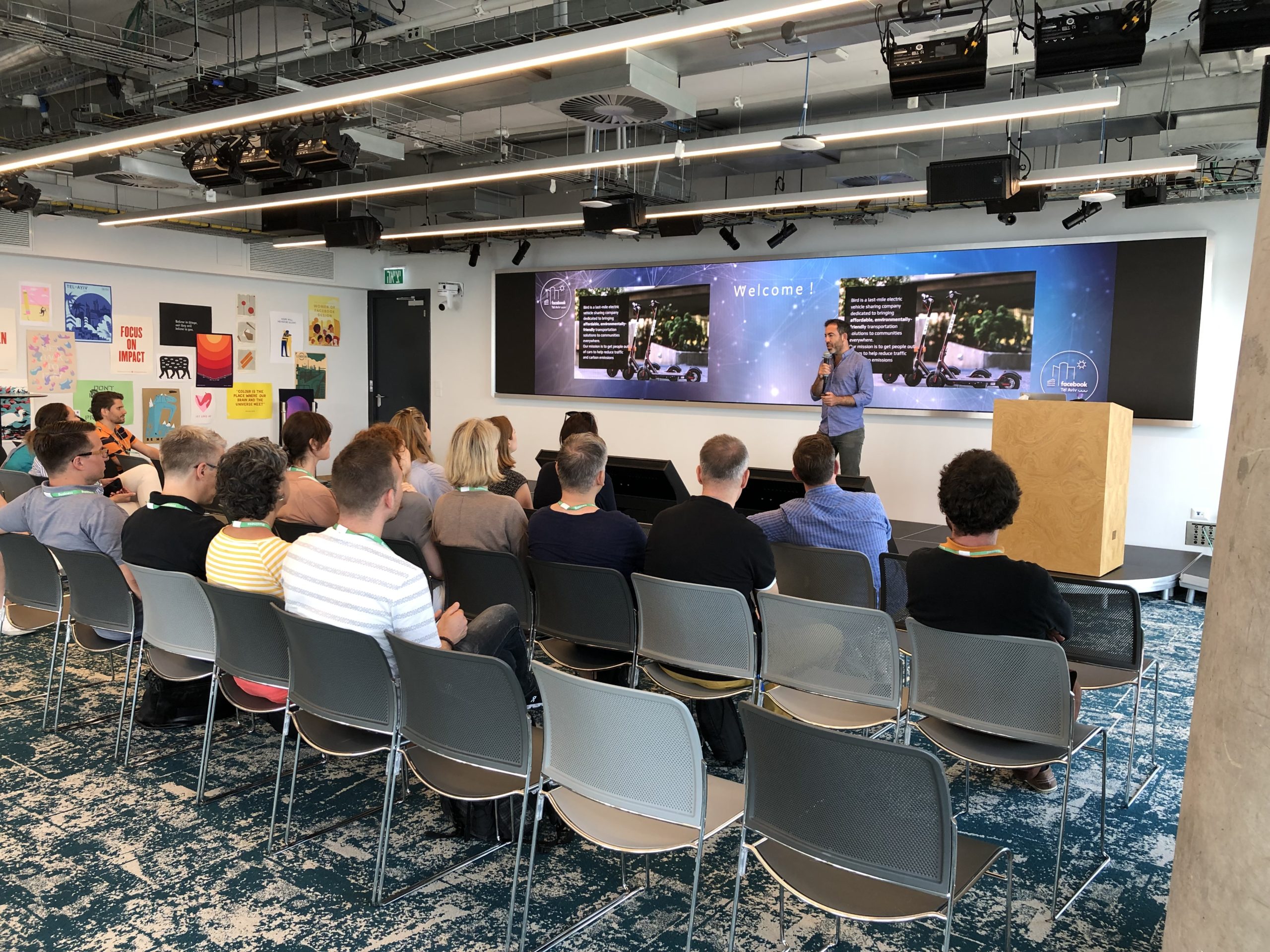24 hours ahead – Digital Master Class 2019 in Tel Aviv
Juni 14, 2019
Jenny Havemann from the German Israeli Innovation Network introduced us to the interesting program: The Study Tour through the Digital Ecosystem in Israel. We gathered in an Urban environment, where a part of Israeli Start-up scene created a hub. Jenny presented the metaphor of a green Banana, which is picked early and ripens to perfection on the way to the consumer. This stands for building a minimal viable product early, failing fast, learning and developing a product which creates resonance and revenue.
Oliver Flückiger gave us an overview of the lean start-up process. The default state of a Start-up is failure. If you build only something new – no one will care. Due to that, nine out of 10 Start-ups fail. A third of Start-ups change their plan drastically before they hit the market. From bootstrapping to market expansion, there are different challenges for financing the operation. Be aware of the burn-rate and the different Valleys of Death. Most of the Israeli Start-up’s look for an Exit, where they can sell their company to a big player earning a lot of money.

Typical Stages of a Start-up – From Invention to Innovation. (after (Blank, 2006) (Hathaway, 2016) (Zenn, 2016) (Kushner, 2018)).
A lean Start-up concept leads to a plan that works in terms of a repeatable and scalable business model. Therefore, a training to internalize a “Lean Start-up Culture” includes the cycle “built-measure-learn”. First of all, the central message is: “Listen to what the consumer wants, do your best to realize this and do only what seems absolutely necessary and not more”. This leads to a minimal variant of a viable product (Minimal Viable Product). A product has to be developed, prototyped, adjusted to reach about 80% of the expected benefit, scaled to the manufacturing process and implemented. This is followed by market launch and further adjustment. Exponential growth is much appreciated. Often it takes a long time to enter the very steep part of the trajectory. A Start-up often fails. Win or learn and do it again…. (Ries, 2011)
After the theoretical overview of the Start-up culture, we moved to practice. Our task was to pitch in a minute our business idea, which will potentially be selected by a team, developed, challenged and enriched by our learning experiences on the study tour, leaving us with a solid business model. The final pitch (5 minutes) will take place at the end of our program in Israel. Twenty very interesting pitches dealing with pain points in our daily lives were presented. Since the founders are partly in the bootstrapping phase, all the information is confidential.

Digital Masterclass 2019 @ Facebook Tel Aviv
Eran Hirsch a System engineer welcomes us at Facebook Tel Aviv with the clear Statement that he does not represent the company. He was part of a company focussing on VPN and App-User-Statistics, which was integrated after a takeover. There was a good culture fit between the two companies and many possibilities to take new challenges in programming and working as an Intrapreneur. A very important tool for him to come up with new ideas and projects is a hackathon.
Computer programmers, graphic & interface designers, project managers, domain experts, collaborate with others who are intensively involved in software projects. They meet in an event with the goal to produce a functional solution using sprint and agile methods to create usable software and/or connected solutions in a very short period of time. People come together to crossbreed their ideas by working and playing hard. Therefore, very often the event is like a festival combined with different cultural and recreational activities including meditation. During a round trip to the office, we recognized special making spaces, music- and meditation-rooms and excellent catering, creating an overall environment that was very attractive. Eran stated: “challenging goals, diverse teams, functional intercultural communication and flat management structures with responsible decision-making are important success factors.”

E-scooters – the freedom of mobility
Yaniv Rivlin, General Manager, Bird-Tel Aviv told us, that his Mother Company founded in 2016 in Venice Beach-California is the fasted Unicorn ever – so far. It only took eight months to reach a one Billion Dollar market capitalisation. Yanniv said: “Marketing for us, that means our product on the street – (almost) no further expenses.” They want to give back the freedom of mobility to the people and encourage them to leave their cars behind. The distance of an average ride is 2 km, often in combination with a public transport system. More than 10 Million rides were registered in just 12 months – still growing fast. Today, they are present in 150 cities, the market is growing fast but there is a lot of competition.
Pay per use, plus a fee per minute is the base of their price model. Prepaid service enable a discount. Part of their business model is to establish a shared economy in the way that people are payed for collecting scooters with empty batteries, for charging and bringing them back to a hot spot, where they are used next. This results in a solution without having to employ too many people permanently. The whole system of finding, reserving, unlocking, using, locking and paying, is of course based on a Smart Phone Application. If a malfunction or a damage is detected, a repair team comes to action. There are 20 people permanently working for the Tel Aviv mechanics team.
One of the most important things for Bird, is to find the right cooperation with a city. The goals they have in common with the mobility community and the responsible administration are reducing traffic jams and air pollution. A challenge is to deal with local and national regulations, when it comes to traffic- and personal-security – because there is a risk for accidents especially related to the misuse on sidewalks. By using big data algorithms, they can analyse the routes and usage to optimise the whole systems for e-mobility. One big challenge is to find the right docks each season where the story begins – hop on.
Yoav Dreifuss gave us deep insights relating to the Israeli (Start-up) culture, by telling his own story. He refers to the book Start-up Nation by Dan Senor and Saul Singer, 2009 and his own background. Yoav grew up in Switzerland, migrate to Israel and founded the content marketing company Digipave.
Service in the Israel Defence Forces is mandatory for most young Israelis. The development of a wide array of skills and building a network provides a big potential for entrepreneurs. The IDF stands for a relatively flat-hierarchical environment where improvisation, intelligence, creativity and if necessary the breaking of some rules is highly valued. Critical thinking and even feedback to the Leaders are welcomed to improve the performance. Age, sex, gender and military rank do not matter much, what is requested is to perform under pressure.
Because of the very skilled and trained people, which can perform under uncertainty, the big international companies are all present and the network – including family and friends – is global. Religion and the value-based mind-set to save the world is an important pillar of the Start-up Nation. People within the network of Universities, Companies, Research- and Network-Organization and the Government (reduced taxes), collaborate very actively.
Immigrants who are by definition risk-takers are not averse to start from scratch and have almost nothing to lose in an uncertain environment. One of the big dreams in Israel is to build a company on a successful business model and make a big exit by selling it to an international company.
A human arguing without using actual data is just a person with another opinion. Above all, without an entrepreneurial mind-set, you will not survive in the digital age. Israel is a very dynamic ecosystem in which the entrepreneurial spirit lives.
Blank, S. (2006) The Four Steps to the Epiphany. https://web.stanford.edu/group/e145/cgi-bin/winter/drupal/upload/handouts/Four_Steps.pdf abgerufen am 13.06.2019 Hathaway, I. (2016) What startup accelerators really do, Harvard Business Review https://hbr.org/2016/03/what-startup-accelerators-really-do abgerufen am 13.06.2019 Kushner, R. (2018) Accelerate This!: A super not boring guide to startup accelerators and clean energy entrepreneurship. Nexus, Oakland Ries, E. (2011) The Lean Startup, How today´s Entrepreneurs use continuous Innovation to create radically successful Businesses. Currency, New York Zenn, J. (2016) Startup funding stages. Evus technologies http://www.evus.com/blog/startup-funding-stages/ abgerufen am 13.06.2019
Unser Newsletter liefert dir brandaktuelle News, Insights aus unseren Studiengängen, inspirierende Tech- & Business-Events und spannende Job- und Projektausschreibungen, die die digitale Welt bewegen.